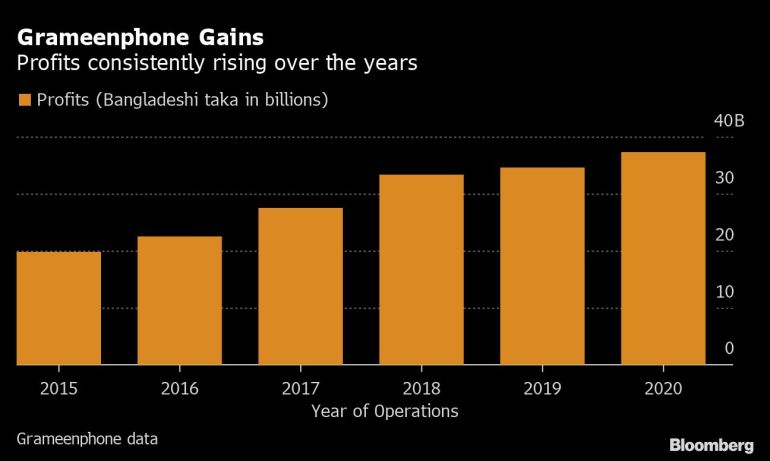High taxes curb investments, says Bangladesh’s Grameenphone
Bangladesh’s largest phone company pays South Asia’s highest levels of corporate tax at 40 percent, hindering efforts to expand services.

Bangladesh’s high tax rate is discouraging telecoms operators from investing further in the South Asian nation as it prepares to adopt 5G technology, according to the head of the country’s largest phone company.
Grameenphone Ltd., which is also Bangladesh’s biggest listed company by market value and majority owned by Norway’s Telenor ASA, pays South Asia’s highest levels of corporate tax at 40%, which hinders efforts to expand services, said Yasir Azman, the company’s chief executive officer. That compares to 22% in neighboring India and 30% in Pakistan, according to industry body GSMA.
Keep reading
list of 4 items1971 Bangladesh: ‘None of them returned’
For Norway’s Telenor, Myanmar’s coup leaves ‘many dilemmas’: CEO
Telenor signals Myanmar exit, as UN calls for urgent action
“If there’s a better tax regime, there’ll be more investment and more innovation will come into the market,” Azman said in an interview. Telecom services are “no longer a luxury product. It’s a necessary product. It’s an integral part of our growth and our people.”
As one of Asia’s fastest growing, but poorest nations, mobile phone companies are a major source of revenue for Bangladesh’s government, with the sector accounting for 5.3% of the country’s economy. Mobile technology is key to the nation’s “digital transformation,” a key theme in Prime Minister Sheikh Hasina’s manifesto known as Vision 2021, the year that marks the country’s 50th year since independence following Bangladesh’s violent breakaway from Pakistan.
‘Significant Role’
But private carriers claim that the country’s punitive tax system stops them from expanding their networks and ability to reach its rural citizens. Already Bangladesh records some of the world’s lowest revenues per user at $2.90 a month, according to a report published by GSMA in 2018.
“That is why the business environment needs to be very constructive, positive and supportive towards foreign investors for the technology companies,” said Azman, who took the helm as Grameenphone’s first Bangladeshi CEO in February 2020. “We play a critical role in the ecosystem.”
In response to Azman’s complaints, Bangladesh’s Telecommunication Minister Mustafa Jabbar said that Grameenphone’s demand for lower corporate rates can’t be justified just so the company can make more profit.
“The government needs taxes for public spending, everyone must pay tax,” Jabbar told Bloomberg. “If telecom companies invest more to serve customers better, then the question of tax cuts may arise.”
Spectrum Auction
Grameenphone, which dominates Bangladesh’s telecom sector with a just under 50% market share, is banking on growth in data usage as Bangladesh continues to register steady economic growth and a faster recovery from the Covid-19 pandemic than its regional peers.
The company earned a record 37.2 billion taka ($433.7 million) in profits last year, up 7.8% from 2019.

Bangladesh’s GDP is expected to increase to 6.6% in the fiscal year ending June, according to the International Monetary Fund, as the coronavirus pandemic abates and policies remain accommodative. Growth may rise to 7.1% the fiscal year after that, the IMF said.
Despite the company’s criticism of Bangladesh’s tax take, Grameenphone in March purchased an additional 10.4 MHz of spectrum for $391 million, taking its total acquisition to 47.4 MHz spectrum. Now, as the government trials 5G services with state-run Teletalk this month, private operators are preparing for a spectrum auction expected in March.
“I look forward to a better tax regime, I believe that it is possible when we bring in 5G,” Azman said. “We cannot expect that the tax rate will go down to 25% right away, but we can start at 35%.”